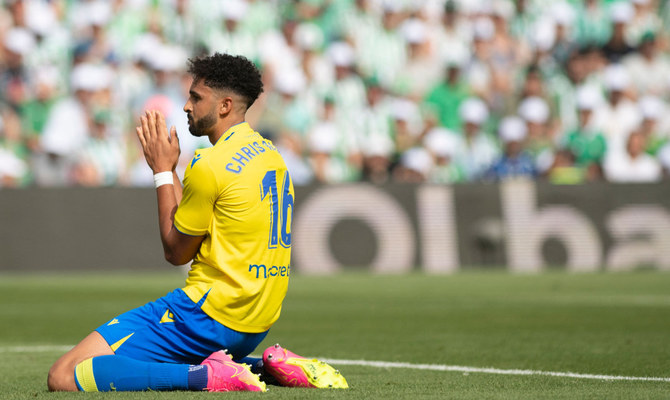BARCELONA: Nine-man Real Betis fell to a shock 2-0 home defeat by Cadiz on Sunday, leaving Manuel Pellegrini’s side sixth in La Liga.
After Villarreal beat Real Madrid on Saturday they leapfrogged Betis, who could not go back ahead of Quique Setien’s side as they stumbled in an Andalucian derby.
Betis playmaker Sergio Canales made his comeback after being given a reprieve from a four-game ban by court order, but it only lasted 38 minutes.
The Spaniard was sent off for pulling down Ruben Sobrino and stopping the Cadiz forward from running through on goal.
Cadiz took the lead from the penalty spot early in the second half through Ruben Alcaraz after Juan Miranda handled a free kick.
The visitors netted their second before the hour mark when Theo Bongonda broke away and unselfishly teed up Chris Ramos to tap home his first goal for the club.
Betis were soon reduced to nine men on a miserable afternoon for the hosts as Aitor Ruibal twice swung his elbow at Fali and was dismissed.
Earlier Vedat Muriqi hit a brace, including a stoppage-time penalty, to rescue Real Mallorca a 3-3 draw at Real Valladolid.
Later Sunday Almeria welcome Valencia in a relegation battle, while third-placed Atletico Madrid visit neighbors Rayo Vallecano in a Madrid derby.
On Monday leaders Barcelona can move 15 points clear with a win against Girona.
Separately, media reports said Real Madrid midfielder Fede Valverde punched Villarreal’s Alex Baena in the face after the champions’ 3-2 defeat.
Baena complained on Twitter on Sunday about being “attacked” and denied he had insulted Valverde’s family, which some reports cite as the reason for the Uruguayan’s anger.
“I’m very sad for the attack that I suffered after the game and surprised about what they are saying about me, it’s totally false that I said that,” wrote Baena on Twitter.
“Fede Valverde, thuggish and cowardly,” Villarreal team delegate Xisco Nadal wrote on Twitter on Sunday, before later deleting his post.
Referee Javier Alberola Rojas did not include any reference to the incident in his report from the game.
Spanish newspaper Marca report that sources close to Valverde say Baena upset the Madrid player during the teams’ Copa del Rey clash in January by speaking about his unborn child.
Valverde’s partner Mina Bonino revealed in February the couple thought they had lost their baby, but the pregnancy was later found to be healthy.




























